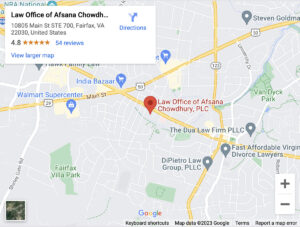
Each state has its own laws governing divorce. The divorce process in Virginia differs from other states but also has many similarities. Hiring a Fairfax divorce lawyer at Chowdhury Divorce Law Group, who is experienced in the Virginia divorce process, will make this process quicker and simpler. Call us at (703) 271-6519.
We will devote the time, resources, and attention to your case that you deserve. Contact our law firm to schedule a consultation with an experienced divorce lawyer in Fairfax, VA.
How Our Fairfax Family Law Attorneys Can Help if You Want to Obtain a Divorce in Virginia

When you hire a Virginia divorce lawyer, you want to ensure that your attorney has the expertise and knowledge to advocate for your best interests. Our Fairfax divorce attorneys at Chowdhury Divorce Law Group have over 11 years of experience handling family law matters.
Our founding attorney, Afsana Chowdhury, is a top-rated family lawyer recognized by state and national legal organizations. She has appeared on the Top 40 Under 40 list by the National Academy of Family Law Attorneys. She also has a perfect 10.0 rating on Justia and Avvo.
When you hire our award-winning legal team, you can expect us to:
- Listen to your concerns and answer your questions about the Virginia divorce process
- Develop a legal strategy to obtain your desired outcome
- Negotiate aggressively on your behalf to obtain a fair divorce settlement
- Handle your divorce case with a high level of care and attention to detail
- Provide practical advice about your legal options during each phase of your case
You do not have to go through the divorce process alone. We are here to provide compassionate guidance and support in addition to experienced legal counsel. Call now for your case evaluation with an experienced divorce attorney in Fairfax, Virginia.
How Do I Begin the Virginia Divorce Process?

Each divorce is unique. The parties and issues involved might dictate different steps that we must take to protect your interests and obtain a final divorce decree. However, all divorces begin by filing a petition for divorce with the court.
The Circuit Court hears divorce cases. The Juvenile and Domestic Relations District Court can resolve issues related to spousal support, child custody, visitation, and child support.
The divorce complaint alleges the reason for the divorce. It also sets forth the petitioner’s request for relief related to divorce, including property division, domestic support, and child custody. You must serve a copy of the complaint on your spouse.
What Happens After I File a Divorce Complaint in Virginia?

How your spouse responds to the divorce complaint dictates the next steps. You can request a default divorce order if your spouse fails to file an answer or response to the divorce complaint.
In that case, the court schedules a hearing. Your lawyer presents the evidence regarding your request for a divorce. The judge decides the terms of the divorce based solely on your evidence and testimony.
However, if your spouse responds to the divorce complaint, the divorce process can take several paths. You and your spouse can agree to all terms of the divorce and submit a proposed divorce settlement agreement for the judge’s consideration. This process is referred to as an uncontested divorce.
Even if you and your spouse do not agree on all divorce terms now, you can work with your Fairfax divorce lawyers to negotiate a settlement. Negotiating a divorce settlement is less costly and time-consuming than proceeding with a contested divorce. It is important to note that all agreements regarding child custody can be modified if the judge determines the agreement is not in the best interest of the child.
A contested divorce is a case in which the spouses do not agree on one or more divorce terms. For example, they might agree on property division and alimony, but disagree on child custody and visitation.
If the parties do not agree on all matters, the case is scheduled for a trial. A judge hears testimony during a trial and decides the contested matters for the parties.
Divorce trials can be time-consuming and costly. However, they might be unavoidable in some situations.
Some Key Things to Know About Divorces in Virginia
The divorce process is the only way to end a marriage in Virginia legally.
Some things about Virginia divorces to keep in mind include:
- Virginia has several fault grounds for divorce, but many people choose the no-fault grounds of being separated for six months (12 months if you have children) to obtain a divorce.
- All child custody matters are based on what is in a child’s best interest. Virginia custody laws provide factors judges should consider when deciding custody cases.
- Child support is based on the Virginia child support guidelines, but judges have the authority to deviate from the guidelines in some situations.
- Spousal support is not guaranteed under Virginia divorce laws. Issues related to alimony are decided based on the facts of the case.
- Virginia is an equitable distribution state for marital property division. Property is divided fairly, which may or may not mean equally.
Our experienced Fairfax divorce lawyers can answer your questions and review your case during an initial consultation.
Schedule a Consultation With Our Fairfax Divorce Lawyers To Discuss the Virginia Divorce Process
Are you ready to begin the divorce process in Virginia? If so, call Chowdhury Divorce Law Group to schedule your confidential case review with a Fairfax divorce attorney.


